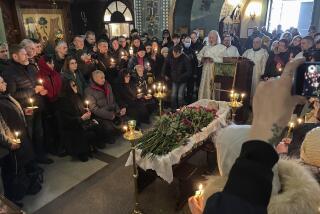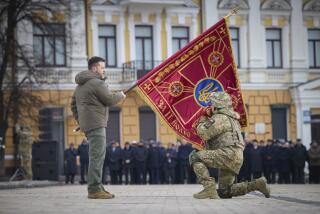Mourners express gratitude for Yeltsin’s accomplishments
- Share via
MOSCOW — Thousands of mourners filed past the open casket of former Russian President Boris N. Yeltsin on Tuesday as his body lay in state in Moscow’s main cathedral, which was demolished in Soviet times and rebuilt under his rule.
Yeltsin’s widow, Naina, and their two daughters sat together as a Russian Orthodox priest gave blessings and ordinary citizens placed flowers near the casket. A choir sang, candles were lighted and incense burned.
“For every believer, Boris Nikolayevich Yeltsin will remain in memory as an outstanding state leader who did so much to overcome the heritage of lack of spiritual freedom,” a presiding priest said during the service.
The televised ceremonies began with the afternoon arrival of Yeltsin’s body in a black hearse. The coffin was carried past an honor guard up the stairs of the golden-domed Christ the Savior Cathedral, blown up in 1931 on the orders of Soviet dictator Josef Stalin as part of his drive against religion. After the 1991 collapse of the Soviet Union, which Yeltsin helped to trigger, it was rebuilt as part of an Orthodox renaissance.
The cathedral was to be open overnight for mourners. A memorial service with visiting dignitaries, including former Presidents Clinton and George H.W. Bush, was scheduled for this afternoon, to be followed by burial at Novodevichy cemetery, where many prominent Russians are interred.
“Boris Nikolayevich did so much for the country and the people,” said Natalya Shestakova, 19, a student waiting in line to enter the cathedral. “Thanks to him our generation has lived in a new country, free and open to the world. We can read the books we want, we can watch the movies we want, we can go abroad and see the world. Our parents were deprived of all those things when they lived back in the Soviet Union, which Yeltsin destroyed.”
Mixed legacy
Yeltsin, who died Monday of heart disease at 76, left a mixed legacy. He played a key role in bringing a measure of democracy to Russia but failed to deliver on the promise of prosperity. His years in power saw many Russians fall into poverty and some become rich, often through the corrupt privatization of state assets.
Russian Orthodox Patriarch Alexei II, in a statement of condolences to Yeltsin’s widow, praised the former president as someone who “devoted all his strength” to building a new Russia.
“The restoration of the once-ruined holy shrines, in all their splendor, got underway, theological seminaries were reopened and the Orthodox Church’s educational, charitable and public activities were restarted,” he said.
Many of those who came to honor Yeltsin said they were thankful for what he had given his country despite his flaws.
“I am very grateful to Yeltsin for crushing the hateful communist yoke,” said Sergei Goncharenko, 54, a construction designer. “For a while, he guided the country in the right direction, overseeing brave economic reforms and building real democracy. But then he got weak and tired, and began to make mistakes one after another. He plunged the country into a bloody war in Chechnya.”
‘Right instincts’
Andrei Shumsky, 35, a businessman standing in line, said he credited Yeltsin with making it possible for him to become an entrepreneur.
“Think about the tremendous transition from a socialist economy to market relations that Russia has made in less than two decades,” Shumsky said. “Yeltsin was a man of the old system, but he had the right instincts.
“His basic instinct was to give people freedom and then they can sort things out for themselves,” he said. “This is what he did, and this is what millions of people in our country are so grateful to him for.”
*
Times staff writer Sergei L. Loiko contributed to this report.
More to Read
Sign up for Essential California
The most important California stories and recommendations in your inbox every morning.
You may occasionally receive promotional content from the Los Angeles Times.












